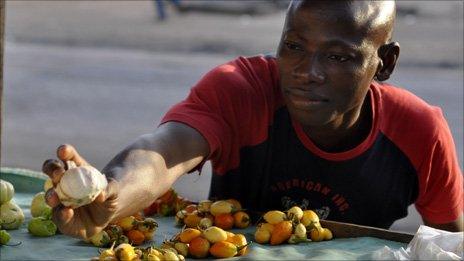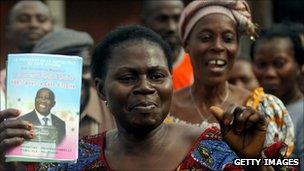'Ivory Coast politics ruined my marriage'
- Published

Toure, a father of three who did not want to use his surname, used to leave the shopping to his wife before the political problems
Life is bustling again at a huge fruit and vegetable market in the Plateau neighbourhood of Abidjan. Only six months ago, it was a ghost town as thousands fled the post-election violence.
The women stallholders joke with one another as small children chase each other around tables piled high with yellow plantains, green okra and red chilli peppers.
Suddenly, a ripple of giggles erupts as Toure, a 39-year-old Ivorian man, enters the market.
"Here he comes - the man doing a woman's job," shouts one of the stallholders. "Don't you have a wife?" goads another.
Toure smiles and responds: "maybe I'm not married".
It is only a ruse. Toure is married. He has been for the past 13 years, and he and his wife have three young daughters.
But ever since last November's disputed election, Toure and his wife no longer speak.
"We still live in the same house, but my wife started seeing politics along ethnic lines."
'Pushed too far'
Toure's story is very much a metaphor for what is going on in the country.
He is from the north of Ivory Coast. His wife is from the west.
While he supports the current President, Alassane Ouattara, his wife supports the ex-President, Laurent Gbagbo.
The country was brought to its knees by post-election violence as Mr Gbagbo refused to concede defeat.
Months of turmoil followed; nearly 3,000 Ivorians were killed and 500,000 displaced.
As the conflict worsened, so did things in Toure's house.
"She started wearing T-shirts with Gbagbo's face on the front and singing Gbagbo songs," he says.
"She started developing some kind of hatred towards northerners simply because many of us support Ouattara."
Toure says he became exasperated with her behaviour.
"One day, I beat her. I never did it again, but she pushed me too far with her taunts about northerners."
I put it to Toure that this might be the reason she's stopped speaking to him.
"No, she started rebelling against me even before this. I'm not an angel, I recognise that I lost my temper."
War crimes
I ask Toure how a couple who once loved each other and had three children together could be split by politics.
"At one point we were very, very happy together. We used to laugh about our political differences and she told me when you married someone, it means you embrace his tribe, his family and everything about them."

Like Toure's wife, these people remain loyal to Mr Gbagbo, and want him released
Toure fills a black plastic bag with tomatoes. It used to be his wife's job to do the shopping but now, he says, she refuses.
I ask Toure if she might speak to me.
"No. There's no way. She doesn't want to have anything to do with me any more," he says.
President Ouattara has launched a truth and reconciliation commission to try to heal the wounds of the conflict.
It is modelled on the one created in South Africa after apartheid. But it is not yet clear whether it will issue amnesties and pardons for those who admit wrongdoing.
Mr Ouattara has also welcomed the chief prosecutor of the International Criminal Court, Luis Moreno-Ocampo, to investigate war crimes and crimes against humanity during the six-month-long political crisis.
"We will focus on the most egregious and the most responsible," said Mr Moreno-Ocampo.
'Cat and mouse'
Meanwhile, Mr Gbagbo is being held in the north of the country, charged with looting, armed robbery and embezzlement in connection with the post-election unrest.
Despite the new steps towards reconciliation, Toure says he does not have much faith in the process.
He wonders how an entire country can forgive, put aside political differences and move forward when - in his home - those same divisions have ruined his marriage.
"The crisis between her and me is so deeply rooted in her heart. It's like mouse and cat sleeping and sharing the same house."
Toure says he remembers a time when Ivory Coast was peaceful, happy and full of hope - much like the feelings he had on his wedding day.
Now as he watches his marriage slip away, he can only hope the same does not happen to his country.
Toure's story features in Assignment on the BBC World Service. Listen to the programme via iPlayer or download, external the podcast.